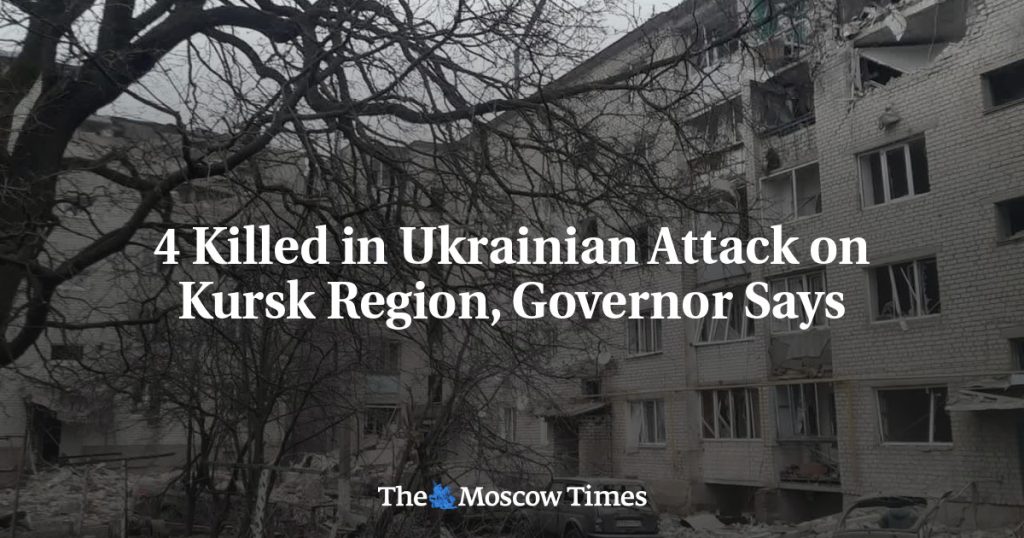At least four people were killed and five others were injured in a Ukrainian attack on the town of Lgov in Russia’s southwestern Kursk region. The attack was described as barbaric by local authorities, with three people killed and a fourth succumbing to injuries later in the hospital. Alexander Khinshtein, the acting Kursk region Governor, reported that five people were hospitalized, with one woman in critical condition receiving medical and psychological assistance. Russia’s Investigative Committee claimed that the attack was carried out with U.S.-supplied HIMARS rockets. Eyewitness video showed extensive damage to an apartment block, with the roof blown off, windows shattered, and nearby cars crushed by debris.
Lgov, located about 70 kilometers east of Russia’s border with Ukraine, has experienced regular shelling since Ukrainian forces launched a surprise incursion into the Kursk region in early August. The town is situated just west of the Kursk Nuclear Power Plant, where Russian officials have expressed concerns about potential Ukrainian strikes. There was no immediate comment from Russia’s Defense Ministry or the Kremlin regarding Wednesday’s attack. Ukraine’s military stated that its forces had fired on an abandoned building in Lgov allegedly used by Russia’s 810th Guards Naval Infantry Brigade. The shelling in Kursk took place after Russia launched a large-scale aerial strike on Ukraine, resulting in at least one fatality and leaving thousands without power due to damage to critical energy infrastructure.
The Moscow Times, an independent news outlet in Russia, faces challenges as it has been labeled as an “undesirable” organization by Russia’s Prosecutor General’s Office. The labeling and criminalization of their work puts their staff at risk of prosecution, following an earlier unjust classification as a “foreign agent.” These actions are perceived as attempts to silence independent journalism in Russia, with authorities claiming that their work discredits decisions made by the Russian leadership. The staff at The Moscow Times refuse to be silenced and seek support from readers to continue their work. By supporting The Moscow Times, individuals can defend open, independent journalism in the face of repression and support accurate, unbiased reporting on Russia.
The conflict between Russia and Ukraine has escalated, with both sides engaging in attacks that have resulted in casualties and significant damage. The ongoing shelling in Lgov and the large-scale aerial strike on Ukraine are indications of the heightened tensions between the two countries. The use of U.S.-supplied HIMARS rockets in the attack on the town of Lgov adds another layer of complexity to the situation. Concerns about potential strikes on critical infrastructure, such as the Kursk Nuclear Power Plant, raise the stakes in the conflict and highlight the risks faced by civilians in the region. The lack of immediate response from Russia’s Defense Ministry or the Kremlin indicates the complexities and challenges in addressing the escalating violence.
The targeting of specific military units, like Russia’s 810th Guards Naval Infantry Brigade, by Ukrainian forces adds a strategic dimension to the conflict. The exchange of attacks and counterattacks between the two countries demonstrates the volatile nature of the situation and the potential for further escalation. The impact of the conflict extends beyond the immediate casualties and damage, as seen in the disruption of power supply for thousands of people due to damage to energy infrastructure. The violence and instability in the region have significant humanitarian consequences and require urgent attention and resolution. The need for international intervention and dialogue to de-escalate the conflict and prevent further loss of life is paramount in addressing the ongoing crisis in Ukraine and Russia.
The actions taken against The Moscow Times highlight the broader challenges faced by independent journalism in Russia. The labeling of the outlet as an “undesirable” organization and the criminalization of their work reflect efforts to suppress dissenting voices and control the narrative in the country. Despite these challenges, the journalists at The Moscow Times remain committed to providing accurate and unbiased reporting on Russia. The support and solidarity of readers are crucial in enabling independent journalism to continue operating and serving as a vital source of information. By standing with The Moscow Times, individuals can uphold the principles of press freedom and advocate for transparency and accountability in the face of repression and censorship.


